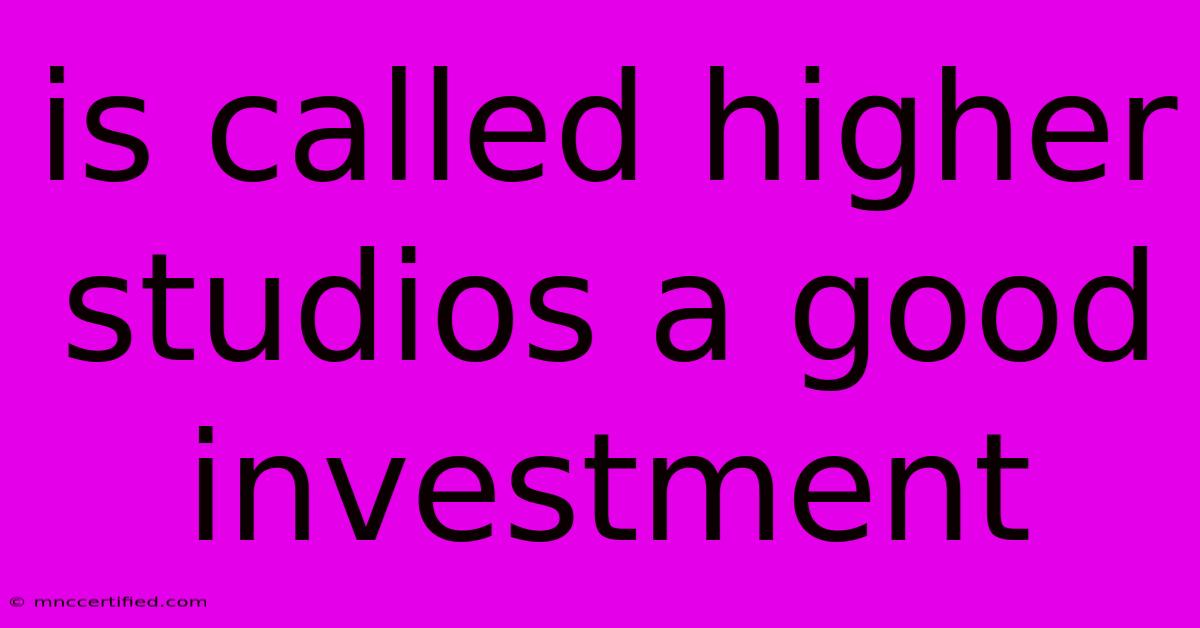Is Called Higher Studios A Good Investment

Table of Contents
Is Higher Studios a Good Investment? Exploring the Potential of Higher Education in 2023
The world of education is rapidly evolving, and with it, new opportunities for investors are emerging. Higher studios, also known as student housing, have gained significant attention as a potential investment avenue. But is it truly a good investment? To answer that, we need to delve into the factors that drive this market, the potential returns, and the associated risks.
The Rise of Student Housing: Understanding the Demand
Rising Student Population: The global student population is steadily increasing, with millions seeking higher education each year. This growing demand creates a robust market for student housing, especially in major university towns and cities.
Urbanization and Housing Shortages: Rapid urbanization and limited housing supply in many urban areas contribute to the demand for student housing. As students flock to cities, competition for affordable and suitable accommodation intensifies.
Convenience and Amenities: Higher studios often provide a range of amenities that appeal to students, such as on-site gyms, study spaces, and social lounges. These features add value and contribute to the overall student experience.
Potential Returns and Investment Benefits
Stable Rental Income: Student housing typically enjoys a stable rental income stream. Students are often committed to long-term leases, providing predictable cash flow for investors.
Appreciation Potential: Like any real estate investment, higher studios have the potential for capital appreciation over time. As the demand for student housing continues to rise, property values may appreciate.
Tax Benefits: Many jurisdictions offer tax benefits for real estate investments, including student housing. These incentives can significantly enhance the financial returns.
Risks and Considerations
Competition: The student housing market is becoming increasingly competitive, with various developers and investors vying for student tenants.
Market Fluctuations: Economic downturns or changes in university enrollment patterns can impact the demand for student housing, potentially affecting occupancy rates and rental income.
Maintenance and Operating Costs: Higher studios require ongoing maintenance and operational costs, such as utilities, property management, and repairs.
Regulatory Environment: Local zoning laws and regulations can impact the development and operation of student housing projects. Investors need to be aware of these regulations before making any investment decisions.
Conclusion: Weighing the Pros and Cons
Investing in higher studios can be a promising avenue for investors seeking stable rental income and potential capital appreciation. However, it's crucial to conduct thorough research, understand the market dynamics, and carefully assess the associated risks.
Key Takeaways:
- High demand: The growing student population and limited housing supply create a favorable market for higher studios.
- Stable income: Student housing typically offers consistent rental income due to long-term leases.
- Potential appreciation: Property values can appreciate over time, providing capital gains.
- Risks: Competition, market fluctuations, and operating costs need careful consideration.
Ultimately, the decision to invest in higher studios depends on individual financial goals, risk tolerance, and market conditions. By conducting thorough research, consulting with financial advisors, and understanding the potential benefits and risks, investors can make informed decisions about this emerging investment opportunity.

Thank you for visiting our website wich cover about Is Called Higher Studios A Good Investment. We hope the information provided has been useful to you. Feel free to contact us if you have any questions or need further assistance. See you next time and dont miss to bookmark.
Featured Posts
-
Donald Trumps Term Dates And Details
Nov 07, 2024
-
Get Live Score Psg Vs Atletico November 6 2024
Nov 07, 2024
-
San Francisco Mayoral Race Lurie Takes Early Lead
Nov 07, 2024
-
Bitcoin Hits Record High Following Trump Victory
Nov 07, 2024
-
Manatee Insurance Exchange Reviews Florida
Nov 07, 2024